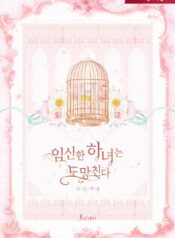Mrs. Medwin muttered while calming her startled heart.
“I don’t think I’ll live much longer.”
“Please don’t say that. You’ll live a long life, Aunt.”
“I’ll die early from aging too quickly because of my nephew. Where did you leave your cane to walk around so dangerously?”
“I thought it wouldn’t be necessary inside the house, so I left it in the study. Please don’t worry too much, Aunt. I have the mansion’s interior layout perfectly mapped in my head.”
“Showing off how smart you are?”
“It’s not showing off, just an objective fact. The condition of the floors, the position of furniture, the arrangement of frequently used items, all without the slightest error. I won’t need to use a cane from now on. But I’ll always carry it when going out, so don’t worry.”
Mrs. Medwin, lost her will to counter his eloquence.
“Fine, let’s say that’s true.”
“It is.”
Mrs. Medwin thought she would have no regrets if she could smack him on the head like when he was a child. He was her nephew who could be so irritating one moment, yet turn around and appear so dear and pitiful the next.
‘If only his parents hadn’t died on Bloody Friday…’
Bloody Friday was the massacre of republic government officials by rebels.
Ten years had passed since the revolutionary army overthrew the monarchy and seized power, but they failed to completely win over public opinion due to their radical ideology.
In that gap, noble families united, gave up their privileges, and made gestures of reconciliation toward commoners, including the intellectual class.
Through the Labon Agreement, they reformed the parliamentary system, established a republic, and stabilized the political situation.
Eventually, the revolutionary army lost its justification due to the looting and massacres they had committed throughout their time in power and became rebels.
Having become public enemies, they began eliminating the central figures of the Labon Agreement to regain power, with the von Oestenberg couple being their first victims.
At twenty years old, having lost his parents to the rebels’ vicious tactics, Oscar had to become stronger than anyone else to protect himself and his family.
‘That’s when he lost his smile.’
After nine years of dedication to managing his great house and protecting the country, he was now called a hero.
Children in the capital ran through alleys playing war games, calling out Oscar’s and his unit members’ names, while village girls secretly admired the hero’s face printed in newspapers.
Everyone except his political opponents revered him and sang his praises. But Oscar himself was losing himself because of the symbolism of Oscar Walter von Oestenberg.
To Mrs. Medwin’s eyes, Oscar looked lonely despite being surrounded by crowds.
‘Even though you saved many people, you couldn’t save yourself. How pitiful.’
While many people sincerely followed the hero Oscar von Oestenberg, hardly anyone approached to know the human Oscar.
That’s why Mrs. Medwin hoped someone would appear who could understand and embrace him. Someone who would accept and embrace Oscar’s imperfect self.
‘But it would be difficult to meet such a person.’
When Oscar’s engagement to Miss de Lebutin was decided, Mrs. Medwin honestly wanted to stop him. She wished he would find a marriage partner based on his emotions rather than family interests.
However, after seeing how Oscar treated Claire, her anxiety gradually eased. There was a faint smile on Oscar’s face when he looked at his fiancée.
At that time, Mrs. Medwin harbored a slight hope that Claire might make Oscar happy.
After meeting Claire, Mrs. Medwin agreed that she was the best bride candidate, though she noticed a few concerning things. But Oscar’s happiness took precedence over her thoughts, so she congratulated them on their engagement.
When she heard about Oscar’s broken engagement, Mrs. Medwin lamented.
‘Whenever I saw Claire, something always bothered me and made me uncomfortable and displeased. I thought perhaps I was just being a difficult mother-in-law. I should not have ignored that feeling. Thinking only of Oscar’s happiness ultimately…’
It was a fleeting first love, like a flower blooming alone before spring arrived.
Mrs. Medwin was upset that Oscar seemed to be pushing himself beyond his limits to forget Claire.
“Though I wanted to maintain formality and distance since you’re now an adult and the head of a family, whenever I see you, you still look like a child left by the water’s edge. What can I do? You’re the child I raised with my own hands.”
Just moments ago, Mrs. Medwin’s heart had sunk when she feared Oscar might stumble while walking toward her. Unaware of her concern, Oscar extended his hand to his aunt.
“Would you like me to escort you?”
“Really now…”
Mrs. Medwin reluctantly took Oscar’s hand.
The first thing Oscar did after being diagnosed as visually impaired was to memorize a braille map of the mansion’s interior structure until his fingers were worn.
He had always excelled at spatial perception, but after losing his sight, he focused entirely on developing that ability.
Like a toddler taking first steps, he fearlessly explored various places, expanding his range of movement. Thinking of it like the dark adaptation often experienced in field situations, he adapted quickly.
However, during this adaptation period, he spent many days with his knee torn and bleeding from hitting blunt objects, suffering concussions from falling down stairs, and covered in bruises all over his body.
Her heart broke every time she heard Oscar was hurt. But she couldn’t show her distress because if she became emotional, it would make those around Oscar anxious.
‘Without knowing how I feel…’
When Oscar guided her to the glass greenhouse without any minor mistakes, instead of feeling proud, she first imagined how he must have practiced while injuring himself.
“…You must have worked hard.”
“Thank you for recognizing my efforts. We’ve arrived…”
“Not yet. We need to walk further.”
“I miscalculated.”
Oscar frowned momentarily when he realized he had significantly miscounted his steps, but soon remembered Mrs. Medwin’s stride length.
“I momentarily forgot you were beside me, Aunt.”
“Even a racehorse that only looks forward will lose direction or fall behind if not in sync with its jockey. People can’t accomplish everything alone either.”
Mrs. Medwin struggled to say what she really wanted to.
“…Only those beside you can help you. Ask them for help. It’s not a humiliation but your rightful privilege.”
Oscar remained silent for a while, suggesting he didn’t agree, then changed the subject.
“I had hydrangeas planted because you like them. How do you find them?”
After appreciating the garden for a while, Mrs. Medwin shared her impression with Oscar.
“They’re incomparably beautiful. I’m not just saying that, they truly are beautiful.”
Throughout the garden path, blue, white, and pink hydrangeas formed colonies. This place, fragrant with flowers all year round, was Mrs. Medwin’s favorite spot when she was Sharon von Oestenberg.
A servant waiting in the garden pulled out chairs for Oscar and Mrs. Medwin. When they sat down, a maid brought refreshments.
Mrs. Medwin noticed the butler’s intention from the nutritious food served. Heather was seizing this opportunity to feed his master proper food instead of alcohol.
Mrs. Medwin subtly encouraged Oscar.
“Isn’t it difficult to use utensils?”
“I’m practicing.”
Oscar waited for his tea to cool sufficiently. No matter how much he practiced, he couldn’t get used to consuming food alone.
Being proud, he would rather starve to death than show a messy appearance to others. Mrs. Medwin thought that she and Heather were too soft to break Oscar’s stubborn mindset.
‘Who could break that stubbornness?’
Oscar had a smug expression, believing he could control everything within the mansion.
But when a variable occurred, his expression instantly changed to one of emptiness, and Mrs. Medwin watched with a heavy heart.
She knew she should speak harsh truths when necessary and point things out at the right moment, but her heart always softened at crucial times, and she had never scolded him strongly.
Perhaps this soft-heartedness was why her nephew had grown into such a self-righteous person, she reflected.
While drinking tea and admiring the beautiful flowers, Mrs. Medwin once again expressed her gratitude to Oscar.
“Thank you for planting hydrangeas for me.”
“I’m glad you like them. You used to enjoy looking at hydrangeas before. I imagined your face while planting them.”
“Seeing the hydrangeas is nice, but I would be happier if I could have a meal with you after such a long time.”
“If you’re hungry, I’ll have a meal prepared.”
“You know that’s not what I meant. I want you to eat something.”
“I’m sorry. I’m not hungry.”
“What if you become malnourished? I’m a doctor, do you want people to say I let my nephew starve to death?”
Firmly resolving not to be swayed by her nephew’s eloquence this time, absolutely determined not to weaken, Mrs. Medwin gathered her courage and spoke harshly.
“Oscar, you need treatment.”
“Aunt!”
“I’ve made a request to the Volunteer Association. A volunteer will come to help with your rehabilitation.”
“That’s unnecessary. If that’s the case, you might as well provide me with a high-class pr*stitute.”
Mrs. Medwin was so shocked she couldn’t continue speaking. Could those words really have come from her nephew’s mouth?
Only after turning them over in her mind several times could she accept reality and burst out in anger.
“Where did you learn such vulgar language!”
“Isn’t that Volunteer Association or whatever essentially a place that arranges women for veterans?”
“Wh-what?”
Even after becoming a civilian, Oscar served as an advisor to military-related institutions including the Veterans Association, and though not publicly known, he was still affiliated with the secret intelligence agency.
Therefore, he knew many confidential matters related to that field. Even more than Mrs. Medwin, who served as an advisor to the Volunteer Association.






